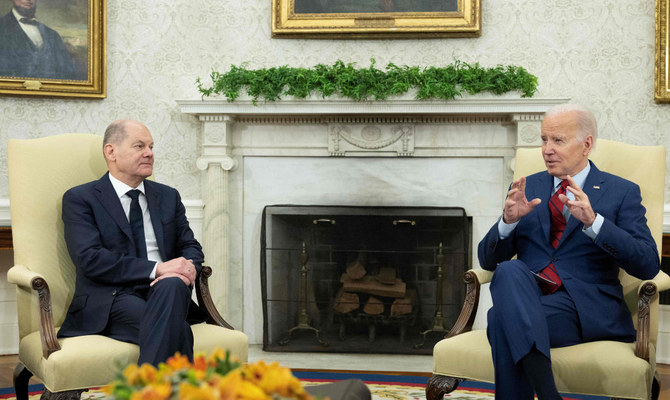
The importance of the transatlantic alliance will be showcased again this week when Joe Biden makes his third big overseas trip as US president, with Europe yet again the destination following his visits there last summer and fall.
While this trip will be dominated by Russia’s invasion of Ukraine, there will be a wider renewal of transatlantic ties after the turmoil of the previous presidency. The goal of the meetings is simple: To present the strongest possible unified front to Moscow while putting aside the division and rancor of the previous era, which coincided with significant UK-EU Brexit-related tensions.
Biden has already made progress with this agenda during his first year in office, including a resolution to the long-running US-EU rift over subsidies to Boeing and Airbus and the suspension of billions of dollars in punitive tariffs.
Biden and UK Prime Minister Boris Johnson also last year signed a new Atlantic Charter, following the original treaty that was signed in 1941 by Winston Churchill and Franklin D. Roosevelt. It was a symbolic move in which the two sides committed to cooperation on a range of issues including climate change, security and post-pandemic recovery.
Building on this during his forthcoming multi-day trip, Biden will meet other Western leaders at an extraordinary NATO leadership summit in Brussels on Thursday. He will also attend at least part of a European Council meeting of 27 national presidents and prime ministers in the same city on Thursday and Friday, where efforts to impose sanctions and arrange further humanitarian efforts will be made.
Outside of these summit formalities, there is a significant possibility that Biden will travel to Poland. The country’s foreign minister, Zbigniew Rau, said on Tuesday that such a presidential visit was “very probable.”
Part of the reason why Biden appears likely to expand his itinerary is pressure from many conservatives for him to be seen to be doing more, including a call from Republican Senate leader Mitch McConnell for him to “go to countries like Poland, Romania or Lithuania to meet with NATO eastern-flank allies.”
Poland appears the most likely option not only because of the number of Ukrainian refugees it is hosting, but also because there might be a need to smooth over an apparent disconnect between the two countries on the issue of supplying Ukrainian forces with fighter jets. Warsaw caught Washington by surprise last week with its proposal to provide Kiev with its Soviet-era fighter jets, a move that was rejected by the Pentagon for fear it might significantly escalate the war.
The overarching theme of Biden’s trip to Europe this week will be Western unity.
Andrew Hammond
While many Republicans are calling for Biden to do more to support Ukraine, the president is also conscious of an alternative, growing critique of him by Donald Trump and some other Republicans who are much more sympathetic to Russia. Trump himself, remarkably, even described Russian President Vladimir Putin’s invasion plan as “genius.” He also criticized EU leaders during the crisis for “taking advantage” of the US, including by not backing the US boycott of all Russian oil and gas imports.
While Trump was correct in his charge that Europe has not instituted a complete ban on Russian fossil fuels, he neglected to highlight the much higher dependency on these commodities in Europe than in the US. He also did not highlight the significant steps the EU has taken in recent days to wean the continent off its dependency on Russian energy supplies and so reduce its vulnerability.
What all of this illustrates is the contrasting approaches of Biden and Trump, who remains the favorite to win the Republican presidential nomination in 2024. The billionaire businessman famously declared during his presidency that “I think the EU is a foe, what they do to us (the United States),” and called for more “Brexits” within Europe.
The contrast between this and Biden’s approach, and indeed much of US policy since the start of the EU integration process, is significant. The core US view since the early phase of the Cold War has, by and large, been that a united Europe makes future wars on the continent less likely, creates a stronger partner for the US in meeting the challenges posed by the former Soviet Union and now Russia, and offers a more vibrant market for building transatlantic prosperity.
Prior to the Trump presidency, the closest the US came to questioning the value of European integration was during the George W. Bush administration. For instance, the controversy surrounding the Iraq conflict caused Washington to query the benefits of collaboration with the EU in the security and defense arenas.
On the eve of the Iraq War in 2003, Defense Secretary Donald Rumsfeld even drew a distinction between “old” and “new” Europe, with the latter, mainly Eastern Europe, perceived as more favorable to US interests.
While US support for EU nations is therefore not as unqualified as it was during the Cold War, the Russian invasion of Ukraine has moved such concerns onto the backburner. The overarching theme of Biden’s trip this week will be Western unity, and the president and his European allies will be doubling down on their efforts to send this message to Moscow.
Andrew Hammond is an associate at LSE IDEAS at the London School of Economics.
Disclaimer: Views expressed by writers in this section are their own and do not necessarily reflect Arab News" point of view












